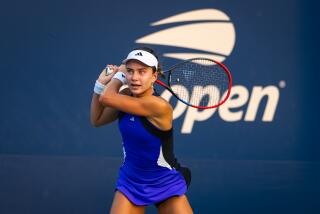Hewitt, Ivanisevic on the Move
- Share via
MELBOURNE, Australia — The future and the past of men’s tennis were on display, and in sharp contrast, at the Australian Open Thursday.
The future wears his cap backward, has striking blue eyes and the kind of long, straggly blond hair that has hordes of teenage girls here all atwitter. His name is Lleyton Hewitt, he is an Australian prodigy who will turn 19 next month, and he is currently playing so well that, despite a ranking of No. 17, appears to be a cinch to work his way into the men’s semifinals, probably against defending champion Yvegeny Kafelnikov.
Thursday, he sent the No. 30-ranked player, veteran Alex Corretja of Spain, away in embarrassment. On the center court of Rod Laver Stadium, before a packed house of 15,021, Corretja, the 1998 ATP Tour Tournament champion who finished that year at No. 3, had to crush a backhand winner just inside the line late in the third set to salvage one game against Hewitt. The 6-0, 6-0, 6-1 score was unthinkable against a player the caliber of Corretja.
At least Hewitt had some empathy, unusual for his age group of tennis player.
“I tried not to look at him,” Hewitt said. “I wouldn’t like to be in that situation. I don’t think anyone can imagine, on center court . . . it’s probably embarrassing.”
More like devastating. Which brings us to the past of men’s tennis.
The past wears his cap backward, except on days when he wears it forward, and has dark scowling eyes, scraggly black hair that is attracting fewer and fewer groupies these days, assuming it ever did. His name is Goran Ivanisevic, a long-ago prodigy from Croatia, who will be 29 in September and who is playing so badly that he is talking, more actively than ever, about retirement.
Ivanisevic had a terrible year in 1999 and has gone from a career top 10 player to No. 50.
But he will always be No. 1 in the category of most-interesting interview. A sample of Thursday night’s session with Ivanisevic, shortly after his 7-6 (5), 6-4, 6-2 elimination by Francisco Clavet of Spain:
“It was the worst thing I ever played in my life. . . . It was like I never played on center court, like I never played a night match, like I never played a Grand Slam. I was completely blocked. . . . I tried to run and it’s like I’m running in the same place . . . I don’t know, maybe I should take some drugs. I never thought really about going to a psychiatrist . . . maybe then I become more crazy than I am now. I’m confused, you know.”
*
In the other evening match Thursday, Martina Hingis beat Belgium’s Justine Henin, 6-3, 6-3, and appears ready for a run at her fourth straight title.
More to Read
Go beyond the scoreboard
Get the latest on L.A.'s teams in the daily Sports Report newsletter.
You may occasionally receive promotional content from the Los Angeles Times.











